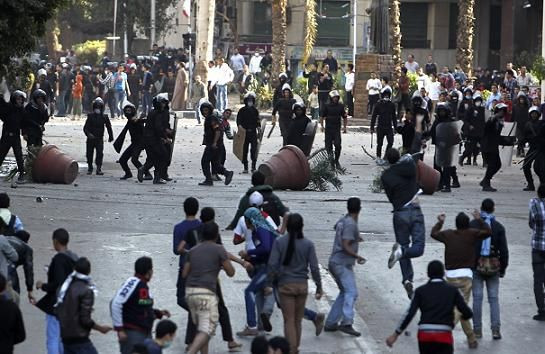One Person Killed In Protests Against Egypt's New 'Pharaoh': Mohammed Morsi

At least one person has been killed and an estimated 100 injured on Tuesday at the ongoing 200,000-person strong protests in Tahrir Square in Cairo, Al-Jazeera said. On Wednesday, the sixth day of protests, Egyptian police fired tear gas at the demonstrators, and there is still no sign that Egyptian President Mohammed Morsi is considering retracting the constitutional decree that grants him wide-ranging new powers.
The deceased man, a 60-year-old named Fatehy Gharib, died of tear gas exposure at the Helal Hospital in downtown Cairo, Al-Masry Al-Youm said.
On Tuesday night, protesters also attacked the Muslim Bortherhood's office in Alexandria, Al-Masry Al-Youm reported, hurling stones and Molotov cocktails at the building.
A final draft of the Egyptian constitution is being readied and will be put to a vote on Thursday, three members of the assembly drafting the document told Al-Arabiya on Wednesday.
Morsi has claimed his new status as Pharaoh will only last until the new constitution is ratified and the new parliament is elected, Al-Arabiya said.
Those powers, among others, place him beyond judicial oversight, a decree the Egyptian courts did not appreciate, and allow him to "issue any decision or law that is final and not subject to appeal," Al-Jazeera said.
The Supreme Constitutional Court accused Morsi of "an unjustified attack on [the Court's] independence," Maher al-Beheiry, the head of the court, told reporters.
Human Rights Watch detailed several of the new powers they found troubling, including an article that forbids any "challenge or oversight of President Morsi," and one that stipulates the president may take "all necessary measures" to "protect the revolution." In sum, the new articles allow any laws and measures Morsi wants to pass into law without judicial approval.
“Egypt is in serious need of judicial reform, but decreeing that the president rule by fiat is no way to achieve it,” Sarah Leah Whitson, Middle East and North Africa director at Human Rights Watch, said in a statement.
“Egypt’s president now has more power than last year’s military rulers who used their position to violate human rights. And President Morsi has exempted himself from any independent judicial review.”
On Monday, Morsi met with Egypt's head judges to discuss the amendment, but the meetings were not successful in persuading Morsi to abandon the new powers. Judge Abdel Rahman Bahlul told Al-Masry Al-Youm and the MENA news agency that "the meeting failed. We cannot say this is the end of the crises between the judiciary and the presidency."
An official statement from the president, released Monday, confirmed that "the immunity granted to the president’s declarations, laws and decisions is restricted to matters of sovereignty and is temporarily effective until a constitution is passed and parliament elections are held,” Al-Monitor said.
This is not the first go-around between the Egyptian courts and the presidency. Bessema Momani, a nonresident fellow at the Brookings Institute, argued that it may be the courts who are corrupt and Morsi should be given a chance.
"The Morsi government was democratically elected," she wrote and pointed out that, after the elections were held, the judiciary, which is stacked with Mubarak-era judges, suspended the legislature under the pretense that it had no right to sit without a constitution in place.
"The judiciary does not trust the Morsi government -- or the Islamists, for that matter," Momani wrote. "Morsi is not right to usurp the judiciary, and his opponents do not have the right to usurp the general will by suspending the constituent assembly."
Morsi's supporters claim the decree works in Egypt's interest, Al-Masry Al-Youm said, by allowing anyone who beat or killed protestors during the Arab Spring to be retried, and also provides for new pensions to be allocated for the families of those killed.
On Wednesday, the Muslim Brotherhood and allied Salafist parties also announced they would be holding counter-protests in support of Morsi on Saturday, Al-Arabiya and Al-Jazeera reported, but there were no details as to where the protests would be held.
It seems at this time, however, that most Egyptians, or at least the loudest ones, disagreed with Momani and the Muslim Brotherhood. Egyptian novelist Alaa Al-Aswany told Al-Monitor that "there are no temporary dictators."
"Morsi has gone against the will of the people," Al-Aswany said. "He has turned into a dictator. All dictators have claimed to be obliged to take temporary extraordinary measures and then seized power forever."
© Copyright IBTimes 2025. All rights reserved.






















